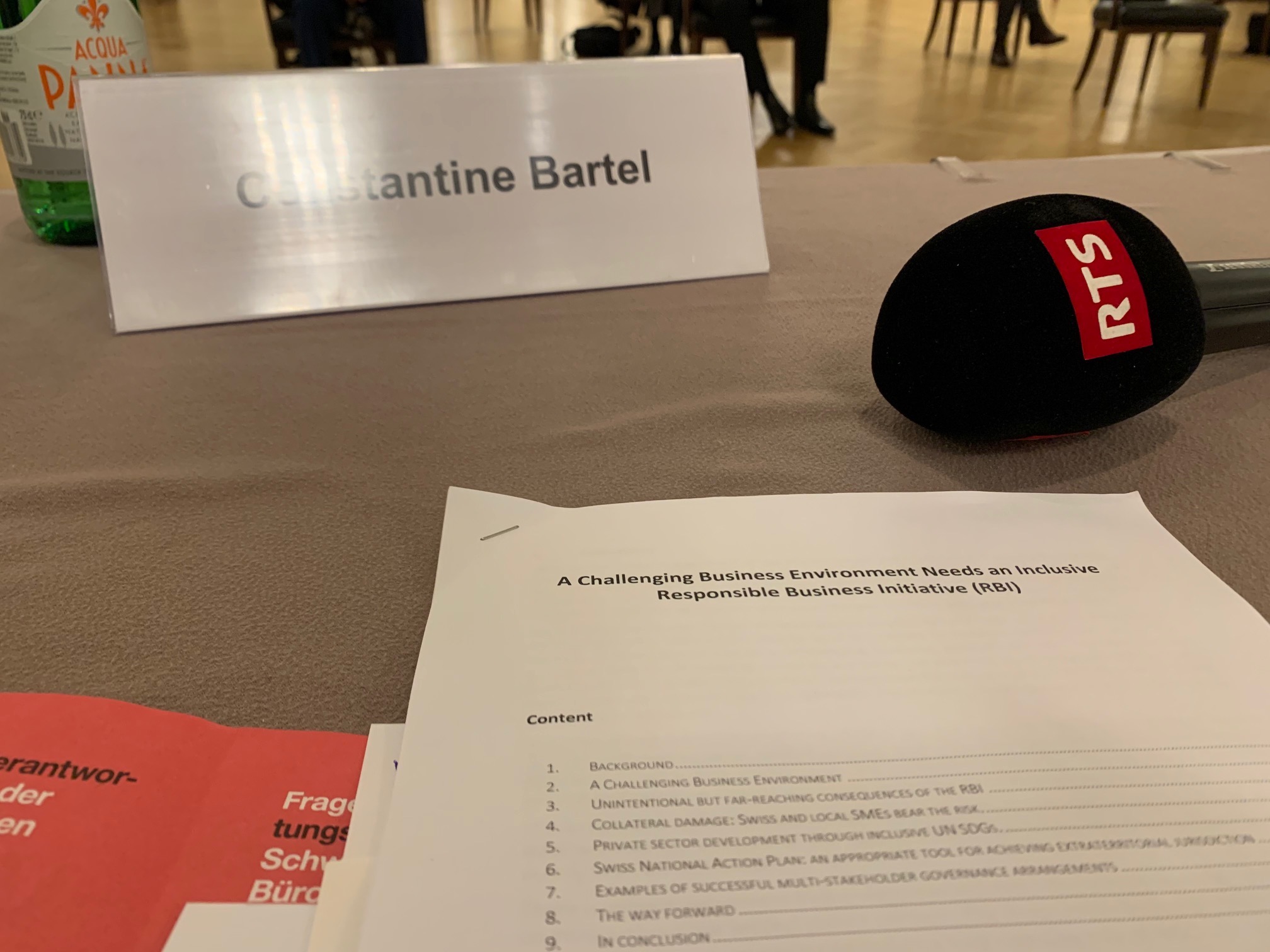Bern, 10 November 2020: H.E. Harouna Kaboré, Minister of Commerce, Industry and Handicrafts of Burkina Faso says “The Swiss Responsible Business initiative is damaging the image and economy of Burkina Faso, as he described how pictures of boys in a cotton field were staged by Swiss NGOs.
A Challenging Business Environment Needs An Inclusive Responsible Business Initiative With Multi-Stakeholder Approaches
Without the active engagement of the private sector and multinational enterprises (MNEs), the Sustainable Development Goals (SDGs) will not be achieved. Local affiliates of MNCs are one of the most effective channels through which technology is transferred across countries. Developing countries need both local and foreign direct investment to improve competitiveness and to facilitate structural changes to create jobs and alleviate poverty.
From the vantage point of local entrepreneurs, a careful read of Article 101a of the Responsible Business Initiative (RBI) would expose local businesses to multiple conflicts with Swiss law. Besides, it is an added risk to a challenging business environment and complex political economy. SMEs in developing countries are better served through Non-judicial mechanisms, promoted by the United Nations High Commissioner for Human Rights (OHCHR) and OECD Guidelines for MNC and multi-stakeholder governance arrangements that transfer knowledge and reduce risks for local and foreign direct investment (FDI).
State-based non-judicial mechanisms (NJMs)[1] is a much quicker and cheaper route to resolve business and human rights-related complaints and disputes between individuals and business enterprises than judicial mechanisms. The application of pressure through these mechanisms generate progressive change within the broader social and political institutions.
There is general agreement that a state may not exercise jurisdiction in the territory of another country without the second state’s consent. The Responsible Business Initiative (RBI) and Swiss Civil Society Organisations could forfeit a long-standing role of NGO’s to reenforce democratic consolidation and social transformation through cooperation and in favour of deploying broader instruments for social transformation in developing countries.
The small number of states that are exercising extraterritorial jurisdiction has not expelled the controversies surrounding extraterritorial jurisdiction. The fundamental dilemma is reconciling the fact every country has the right to regulate its public order, (principle of state sovereignty) and businesses and individuals are increasingly acting, and producing effects, across state borders. To unilaterally assert laws, extraterritorially would mean developing countries will be faced with the dilemmas to apply two or more national laws to the same conduct.
The search for viable and sustainable global mechanisms that can provide certainty and predictability in cross-border trade is critical and must continue. It, however, requires an inclusive debate. So far, the RBI debate is between western NGO’s or more precisely between Swiss NGO’s. No wonder the wrong or insufficiently effective questions are being asked. Indeed, the relevant sources have not been consulted, and practical realities of local entrepreneurs and their business environment are not considered.
2. A Challenging Business Environment
The business environment and economic actors in developing countries, states transitioning to market economies[i] and emerging markets are dominated by the ‘informal sector’. The informal economy includes “all economic activities by workers and businesses that are—in law or practice—not covered or insufficiently covered by formal arrangements”. (e.g. legal licenses, titles, and regulatory supervision)[ii]. These makeup between 60 and 90 per cent of the economy. Of six and a half billion people in the world, roughly four billion are living outside of the law. They are not covered by basic human rights protections[iii]. In India, 93% of the workers are in the unorganised or informal sector.[iv] These local small firms operate in open or harmful environments; they work in unregulated markets. Their activities range from the illegal to the ordinary and compete by using local resources and modifying labour-intensive technologies.
3. RBI has far-reaching consequences
Small businesses are the ‘gateway’ to larger organisations. While news headlines focus on giant corporations, SMEs are the more common victims of risks. There are two conceptual approaches to achieve sustainability objectives in unregulated business environments. One is through the instruments of corporate social responsibility (CSR)[1] and the other through corporate accountability (CA)[2]. Article 101a of the Responsible Business Initiative would be out of step with the bilateral and multilaterally agreed mechanism designed to encourage and enforce corporate accountability.
The perception in much of the developing world is that human rights instruments are crucial. Still, it has often been exploited for political aims. The RBI enforces the idea it is aimed at uncovering abuses and prosecuting perpetrators. It has the potential of upsetting local economic interest and stirring up an adverse reaction in local communities. It could be seen as undermining national legal institutions instead of supporting Swiss businesses to become embedded in the local community.
4. Collateral damage: Swiss and local SMEs bear the risk.
Switzerland’s 5000 SME could bear the collateral damage of increased costs, and reputational risks of Article 101a of the initiative. Swiss SMEs (i.e. firms with up to 250 employees) dominate the countries enterprise landscape, constituting 99.2% of all firms. Only 0.8% of all Swiss enterprises are large companies. Only two of the large companies dominate Swiss public opinion on corporate responsibility. No company has done so more than Glencore’s operations in the Democratic Republic of the Congo and Colombia. This disproportionate focus overlooks two facts: one, over 4000 Swiss SMEs conduct business abroad. And second, Illicit financial flows (IFF) is robbing Africa of an estimated $89 billion each year[v]. The culprits are 1) illegal Markets 2) tax and commercial practices, 3) theft-type and terrorism financing, and 4) corruption. 77% of illicit trade is attributed to illegal mining and smuggling of African gold.[vi]
On Illicit trade, the US and EU have extraterritorial regulations[3] in areas of anti-corruption and trade regulations. It means that Swiss companies are already operating under US and EU jurisdiction even though the US or EU may not be directly involved in the activities of Swiss export-oriented companies[4]. The fines for violations are significant. US enforcement agencies have targeted companies and individuals all over the world.
The added cost for due diligence to comply with Article 101a of the RBI along the value chain could turn legitimate investors away from developing countries, especially when profit margins are slim. This will disproportionately affect small and medium enterprises that are more likely to invest equity rather than non-equity financing.
The RBI is not designed to address Illicit trade which takes place “underground”, is “unrecorded”, “non-protected”, “grey market” in developing countries. For example, Libya, which produces virtually no gold and Egypt report exporting gold to the United Arab Emirates (UAE) in volumes that exceed estimated national production levels in 2016.
5. Private sector development through inclusive UN SDGs.
Sustainable Development Goals (SDGs) emphasise partnerships between stakeholders including governments, international and regional organisations, businesses, academia and civil society. It is central to the work of the United Nations Economic Commissions. SDG 17 which stresses collaboration to mitigate risk is the preferred strategy for improving cooperation[vii] to reduce pressures on the consumption of natural resources[viii] and to create more dynamic and resilient economies.[ix]
SDG 8 underlines the need to generate jobs that offer higher wages and better working conditions – especially for young people. Small rural farmers that sell products to a company have trouble keeping the children away from work. They cannot afford external workers with formal contracts; on the other hand, a responsible company can counteract this by increasing family income and building schools for the children.
Companies doing business in poor communities where human rights offences, including child labour, is the rule rather than the exception must be able to progressively improve the conditions. The fact that returns are generally low because of the small volumes, companies would think twice before engaging in a poor community.
Eliminating child labour from the supply chain and adhere to human rights practices is often a process. With the RBI, a risk-averse company would either withdraw from the community or source its entire inputs from higher up the value chain or from elsewhere. Companies that decide to stay could choose to operate in secluded export processing zones (EPZs) with little backward linkages with the domestic economy.
Companies could opt for Turnkey projects as their primary mode to do business. A turnkey project is a contract under which a firm agrees to fully design, construct and equip a manufacturing/ business/ service facility and turn the project over to the purchaser when it is ready for operation for a remuneration. The N’sele Presidential Farm in the Democratic Republic of Congo (DRC) is one such business model. An island of modern production in a sea of poverty.
Many companies in agricultural supply chains have implemented the OECD-FAO Guidance for Responsible agriculture supply chains to address sustainability issues. However, proper due diligence is often external pressures make translating policy commitments into implementation actions very challenging. To better address, systemic challenges require much closer collaboration with key stakeholders. Engaging local communities would contribute to ‘inclusive’ growth. The RBI initiative is counterproductive precisely because the associated risk levels will encourage ‘exclusive’ development and because local communities would lose out on the benefits.

There is general agreement that a state may not exercise jurisdiction in the territory of another state without the consent of the second state. That is why the Swiss debate is conducted mainly in an echo chamber.
